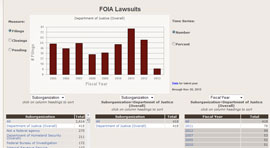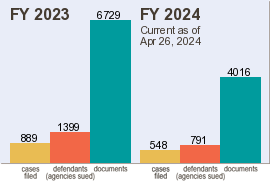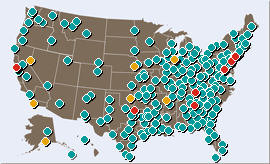CIA “Wins” Inaugural FOIA Failure Award
The National Security Archive first filed a Freedom of Information Act request for the Central Intelligence Agency’s five-volume Official History of the Bay of Pigs Operation a decade ago, in 2005.
But it wasn’t until 2011, when the Archive filed a lawsuit against the CIA on the eve of 50th anniversary of the botched invasion, that it received any documents. As the case slowly made its way through the courts, the CIA gradually relented on releasing various aspects of this multi-volume text.
The agency, however, steadfastly refused to release Volume 5, contending that the half-century old work was a draft and part of its internal deliberations, and therefore exempt from FOIA. The CIA also contended that release of the document wouldn’t serve history well, and would confuse the American public rather than enlighten it.
The case was officially closed on May 20, 2014, when the Archive lost its battle to get the final volume in 2-1 decision by the D.C. Circuit Court of Appeals.
The CIA’s handling of this request was one of six cases nominated by FOIA experts as an example of an agency’s failure to respond appropriately to a request for documents. In honor of Sunshine Week, the FOIA Project wrote case summaries of the six cases, and linked to related documents in the Project’s searchable database of more than 27,000 documents from 8,600 district and appellate FOIA cases. Those cases, updated daily, represent every instance in which the government has been sued under FOIA since Oct. 1, 1996.
Then, starting last week on March 12, we asked the public to vote on which of the six cases was the biggest FOIA Failure. We closed the voting at 10 a.m. today (March 20), and the Bay of Pigs history has emerged as the “winner.”
That case garnered 68 votes out of 264 cast, finishing just ahead of a case nominated by VICE News’ Jason Leopold for documents related to assessments of the damage caused by the Edward Snowden leaks, which received 67 votes. Also close in the running was a nomination from Judicial Watch, which had to go to court and then fight numerous redaction attempts to receive Edward “Ted” Kennedy’s file from the FBI. That case received 63.
All of the cases received at least a dozen votes. The other three dealt with efforts to get a copy of a secret court ruling that found the government’s surveillance and information collection operations violated the Fourth Amendment (33 voters, nominated by David Sobel of the Electronic Frontier Foundation); documents related to the FBI’s use of drones for domestic surveillance (19 votes, nominated by Anne Weismann of Citizens for Responsibility and Ethics in Washington); and a memo outlining the legality of the targeted killing of Anwar al-Awlaki (14 votes, nominated by The New York Times’ Charlie Savage.) Full case summaries are at http://foiaproject.org/2015/03/11/foia-failure/.
The FOIA Project designed the FOIA Failure project for Sunshine Week to: (a) showcase how interesting FOIA cases can be, (b) demonstrate how crucial FOIA is to the public’s right to know, while (c) illustrating the flaws in a system that often requires taking an agency to court simply to get a response to a request for public records. The FOIA Project’s goal is to document and publicize improper withholding, and to help foster a climate that leads to greater compliance with the law.
Nate Jones, Director of the National Security Archive‘s Freedom of Information Act Project and Editor of Unredacted, said he thinks his case was so popular in the voting because of the claim that the American public couldn’t be trusted to make sense of the new information contained in Volume 5.
“That infuriates people,” Jones said, “and it should. It flies in the face of every democratic principle.”
FOIA reform bills before the House and Senate would limit the B5 Exemption to documents no more than 25 years old, which would mean the CIA could no longer claim that exemption for the 50-plus-year-old volume.
Jones said the Archive would file a new FOIA request for Volume 5 “the very next day,” should those reform bills pass with the B5 provision.
Please note: This was not a scientific poll, nor was it meant to be such. Its purpose was to draw attention to all of these cases and FOIA in general.
The FOIA Project is administered by the Transactional Records Access Clearinghouse (TRAC) at Syracuse University. TRAC is a nonprofit, nonpartisan joint research center of the Newhouse School of Public Communications and the Whitman School of Management at SU. The FOIA Project is made possible by generous support from the CS Fund/Warsh-Mott Legacy, OpentheGovernment.Org, The Peter and Carmen Lucia Buck Foundation, and others.
Contact Greg Munno at gjmunno@syr.edu or 315-730-4621 for more information about the FOIA Failure contest or the FOIA Project in general.

 Recent Tweets
Recent Tweets


